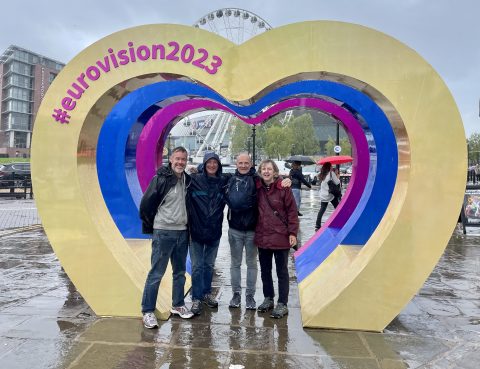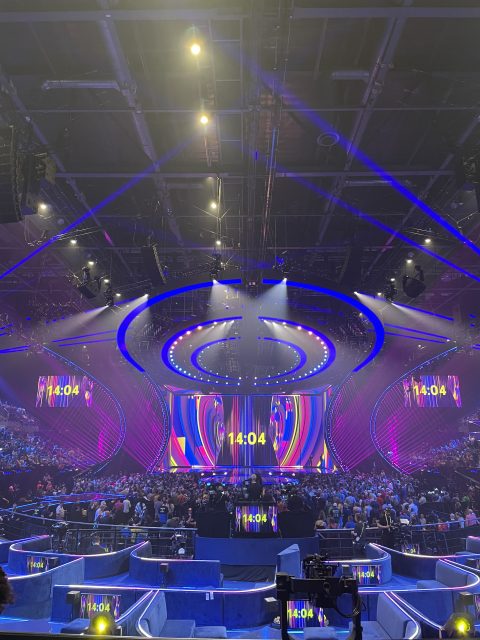Do you sometimes tell your staff and clients what you hope is the truth, rather than what you suspect that truth may in reality be?
It’s an easy trap to fall into. And in Liverpool this year, Eurovision got me thinking about hype, and how that might impact your business.

Facing some damp disappointment with friends in Liverpool
Full disclosure: I’ve been a fan of Eurovision since I was a child. As a boy growing up with a curious fascination for numbers and charts, I was transfixed by the running orders and scores. As a broadcast journalist who thrived on adrenaline, I became hooked on the energy and the slick production. And as a 56 year ticket holder earlier this month, I was mesmerised by actually being there in the Arena.
So these thoughts aren’t written to knock what was a triumph of production by the BBC and the EBU.
But I do offer them as a sense-check for any leader who may take at face value what she or he is told about an aspect of their business (staff morale/the latest product/a new software upgrade, perhaps) without checking it for themselves.
Here are three examples:
- The Euro Village, hyped by the publicity (including BBC News) as a glorious celebration of all things Eurovision, turned out to be nothing of the sort. There were no stands celebrating different countries or their music. Instead, a bland selection of food and drink outlets led to a large stage from which the live performances were held, alongside a stall selling very expensive merchandise.
- The celebration of Ukraine — heralded as being at the heart of this party we were hosting on behalf of the war-torn country — appeared to me to have been shoved into a corner, only reached by carefully following pavement signage. When I found it, a stallholder selling Ukrainian handcrafts told me how bitterly disappointed she and her colleagues were at the situation. I did what I could to publicise this on social media and by contacting journalists, but no reporter that I’m aware of followed it up. Perhaps they feared it might have spoiled the narrative.
- As we now all know, Mae Muller’s entry for the UK, I wrote a Song, ended the contest in 25th out of 26th position. This came as quite a shock after so much gushing commentary on the BBC’s Eurovisioncast Podcast, leading to excited news coverage in the days leading up to the event. But — whisper it — anyone who had carefully noted Mae’s live performances, and the balance of her voice against the music mix, may have sensed trouble ahead. Yet I heard only one commentator (the no-nonsense Swedish expert, Mans Zelmerlow) dare to mention it.

In the Arena – 14 minutes and counting …
It may seem churlish to take an international event of such universal joy, laughter and sheer exuberance — and hammer it into a lesson for business.
So I do it with a raised eyebrow rather than an angry frown.
But perhaps next time you speak publicly about staff morale, before walking the floor for yourself — or take a team leader’s word about the qualities of a product you sell, without holding it in your hands — you may pause to remember the curious way in which Eurovision 2023 came crashing down to earth.